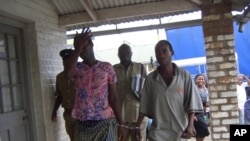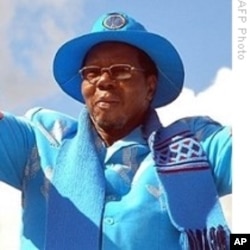Tuesday promises to be a very busy and yet unpredictable day in Malawi as a judge is set to decide the fate of the country’s first openly gay couple.
Steven Monjeza, 26, and his 20-year-old partner,Tiwonge Chimbalanga, were arrested 27 December, a day after they performed a public traditional engagement, the first by a Malawian same sex couple.
Under Malawian law, being gay is a criminal offense punishable by up to 14 years in jail. The country’s religious community is said to be united in its opposition to homosexuality, likening it to Satanism.
On the other hand, Western donor countries and agencies have threatened a review of their aid to Malawi if the couple is found guilty.
Rafiq Hajat, executive director of the Institute for Policy Interaction said whichever way the court rules Tuesday, Malawians are likely to be unhappy.
“There’s tension growing between the conservatives, the puritans and civil society and human rights organizations. In addition, the fray has been joined by church organizations. So, at the moment, I think the atmosphere is one of waiting. But, I think whichever way the court goes, it’s going to leave a lot of very, very unhappy and dissatisfied people,” he said.
Malawi President Bingu wa Mutharika, who is the current chairman of the African Union, may also find himself between a rock and a hard place.
But, Hajat said President Mutharika’s African Union chairmanship will not be tainted, especially with likely support from neighbors Zimbabwe and Uganda, two countries that he said have openly expressed their opposition to homosexuality.
“I think the government of Malawi is actually caught in the middle, but I don’t think it disconcerts the President too much because we have a rather vivid example of President (Robert) Mugabe who has been quite openly blunt and caustic about his views regarding homosexuality. We have example such as in Uganda where homosexuality is punishable by death penalty. So, I don’t think it’s going to affect the AU chairmanship,” Hajat said.
On the other hand, Hajat said, if the couple is found guilty, Malawi could face some consequences, particularly from Western donor countries and agencies from whom the country gets about 40 percent of its development budget.
“I think the issue is more resounding in the West where our aid and budgetary support comes from, and it may affect that inflow which, at a time like this, will not be a good thing for Malawi,” he said.
Hajat said the rights of homosexuals should be protected because they are people.
“When you look at it, it is really quite simple. Are homosexuals humans? Yes, they are. Are human rights selective? No, they are not. Therefore, these people are entitled to protection of their rights the same way as anybody else,” Hajat said.
Hajat said the law under which the gay couple is being tried is a colonial law that is no longer valid in Britain, its country of origin.
“What is the law that is being applied to indict them? It is a colonial law that no longer is valid in the country of origin. So, the whole premise is seen as rather shaky and untenable,” Hajat said.
Hajat said, even though morally Malawians abhor homosexual practices, at the same time, Malawians have always been a tolerant people.
Unfortunately, he said the extensive media coverage that the case has received might have made tolerance and co-existence in the case of the homosexuality couple difficult.





